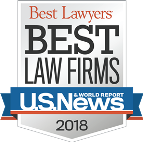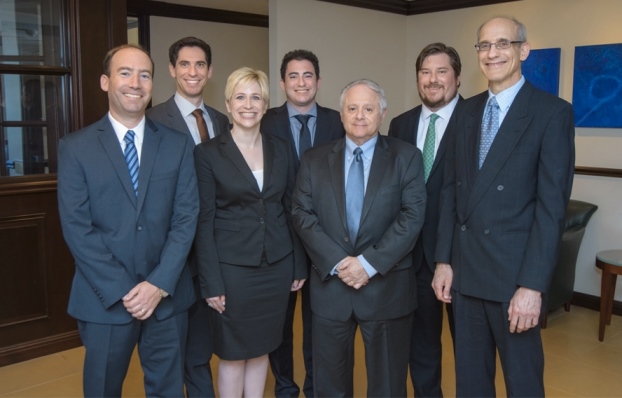Franchise 101: Run for the Border(line) Wage Claim; and Your Neighborhood Inspector
 Southern California Tier 3 Best Lawyers in Franchise Law 2018 bkurtz@lewitthackman.com
Southern California Tier 3 Best Lawyers in Franchise Law 2018 bkurtz@lewitthackman.com
tgrinblat@lewitthackman.com
msoroky@lewitthackman.com
kwallman@lewitthackman.com
August 2018
Attorney of the Year 2018
Barry Kurtz was recognized at the San Fernando Valley Business Journal’s annual Trusted Advisors Awards event as the Valley’s Attorney of the Year , receiving a Client Service Excellence Award . This is the third time Barry was similarly honored. He received Trusted Advisor recognitions previously in 2012 and 2015.
Read: San Fernando Valley Business Journal’s Trusted Advisors
Franchise Law Journal – David Gurnick & Samuel C. Wolf article
“Although franchising is a relatively modern business method, the existence of one-sided agreement is nothing new. From time immemorial, laws and courts have been called upon to protect weaker parties against overreaching…”
Read: Unconsionability in Franchising
Valley Lawyer – David Gurnick & Matthew J. Soroky article
“In 2013, motor fuel was available at about 150,000 locations across the United States. This was a 25 percent decline from two decades earlier when the number of gas stations exceeded 202,000. The number of gas stations is expected to continue to fall and there are many reasons why…”
Read: Gas Station Franchises: Federal & California State Regulations
FRANCHISOR 101:
Run for the Border(line) Wage Claim

The Ninth Circuit Court of Appeals upheld summary judgment in favor of Taco Bell on class claims that employees should be paid under California law for time spent on company premises eating employer-discounted meals during meal breaks.
California law requires employers to relieve nonexempt employees of all duties during required meal periods or pay the employee a meal premium. Taco Bell’s meal break policy let employees, on a voluntary basis, buy discounted meals, but the meals had to be eaten in the restaurant. Taco Bell’s requirement sought to prevent employees from giving the food to friends or family, which Taco Bell considered to be theft.
The plaintiff, a former Taco Bell employee, brought a class action against Taco Bell claiming she was entitled to be paid for time spent on Taco Bell’s premises eating discounted meals during her meal breaks. The former employee argued that because Taco Bell required the discounted meal to be eaten in the restaurant, she was under Taco Bell’s control, making the time compensable.
A lower court disagreed, finding that Taco Bell’s meal policy satisfied California law. This was because Taco Bell relieved employees of all duties and relinquished control over their activities during meal breaks. In upholding this ruling, the Ninth Circuit noted that under the discounted meal policy, employees were free to use meal break time as they wished, and an employee had to stay on premises only if the employee voluntarily chose to buy a discounted meal. The Ninth Circuit found the requirement to eat the discounted meal on premises did not amount to control over the employees’ working conditions.
In California, an employer must relinquish control over nonexempt employees during meal breaks. Franchisors and franchisees that employ nonexempt employees should have their meal break policies, and any changes to the policies, reviewed by counsel before implementation.
Rodriguez v. Taco Bell Corporation, No. 16-15465 (9th Cir. July 18, 2018)
FRANCHISEE 101:
Your Neighborhood Inspector

A Tennessee federal judge granted a preliminary injunction in favor of AmeriSpec, a national franchisor of property inspection services, enforcing a one-year post-termination covenant not to compete against its former franchisee.
The franchise agreement expired May 1, 2017. The franchisee did not sign a new franchise agreement or notify AmeriSpec of any intent not to renew. After expiration, the franchisee continued to operate using AmeriSpec’s trademarks and business systems and continued to pay franchise fees to AmeriSpec.
In February, 2018, the franchisee opened a competing inspection business, advertising that “Your Local AmeriSpec is now American Property Inspections.” AmeriSpec then wrote to the franchisee, complaining that he was violating the agreement’s non-compete clause, demanding that he stop operating the competing business and providing him thirty days to cure. After the franchisee did not respond to the letter, AmeriSpec sued.
The franchisee argued that the franchise agreement expired May 1, 2017, meaning the one year post-term non-compete expired May 1, 2018 and was no longer enforceable. The court rejected this argument, finding that the parties operated under the franchise agreement or an implied contract with the same terms, until April 7, 2018 – thirty days after AmeriSpec wrote to the franchisee. The court found no evidence of the franchisee communicating intent not to renew the franchise to AmeriSpec. The court concluded that the parties created an implied contract based on conduct, that the non-compete covenant was enforceable and AmeriSpec would be irreparably harmed without injunctive relief.
Franchisees considering operating a competing business should pay close attention to the non-compete provisions of their franchise agreements and should consult their legal counsel about the implication of such provisions before starting such an endeavor.
Amerispec, L.L.C. v. Omni Enters., Inc., 2018 WL 2248459 (W.D. Tenn. May 16, 2018)
